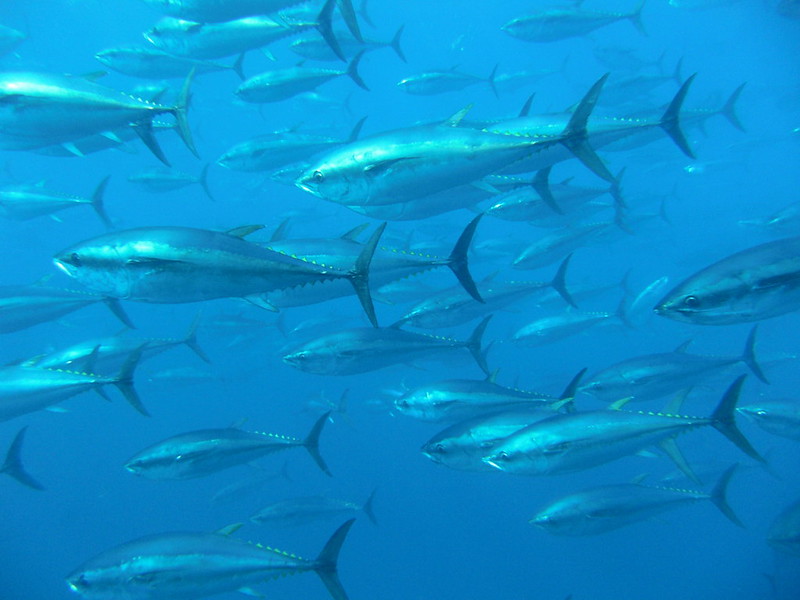10 novembre 2022

Next week, parties and observers to the International Commission for the Conservation of Atlantic Tunas (ICCAT) will meet along the southern coast of Portugal for what may be one of the most exciting annual meetings in the organization’s history. Up for adoption is one of the longest running and most ambitious undertakings ever performed for a single species of fish, one fit for the tumultuous history and global importance of one of the most controversial but beloved fisheries in the world.
In 2008, Atlantic bluefin tuna were called “a travesty in fisheries management” and some countries and environmental groups tried to halt their international trade entirely by proposing the species to CITES Appendix I in 2010. The effort did not pass, partly because ICCAT committed to improving the fishery. Since then, two different stories have emerged.
In the eastern Atlantic and the Mediterranean, catch was slashed by over 80% in 2010 as part of a bold strategy to rebuild the stock. This effort paid dividends, with the population having recovered to numbers not seen in decades. The question in the east is how can we maintain this improvement going forward?
Across the sea, the western Atlantic population may still be depleted, despite recovery efforts that started back in the early 1980s and have proceeded in fits and starts since then. The question in the west is how can we ensure the population finally achieves – and maintains – a healthy abundance?
Scientists together with fishery managers completed a management strategy evaluation (MSE) this year that seeks to achieve both of these goals simultaneously for at least the next 30 years. It was perhaps the most intensive scientific process ever conducted for an MSE, as bluefin tuna in the Eastern and Western Atlantic are separate stocks that still have considerable overlap – fishing on one side of the Atlantic can impact the number of fish available on the other side, and the fish from the two sides are physically indistinguishable, even for experts. How to handle this mixing was a difficult scientific question, and an even more sensitive political one that has challenged Atlantic bluefin management for decades. Nonetheless, after eight years of research and discussions, countries on both sides of the Atlantic were able to agree on a set of proposed management objectives and advance a recommendation that could be adopted next week as the first ever harvest strategy (or management procedure) for Atlantic bluefin tuna, and the first ever for a mixed stock fishery. ICCAT has an opportunity to build on the legacy of the harvest strategy for Southern bluefin tuna, and in the process work towards fulfilling their promise from 2008.
Details still need to be finalized. Objectives that are more precautionary, such as having a 70% chance that the fishery remains in the “green” quadrant of the Kobe plot (i.e., not overfishing, nor overfished), would give this effort the best chance for long-term success. But by the meeting’s end, we are confident that a harvest strategy will be formally adopted that will be a win for conservation, industry, scientists, and managers. Not only will it improve the health of the Atlantic bluefin tuna population, it will also increase transparency and predictability of the fishery that could take it off the “boycott list” once and for all and allow people to purchase it at restaurants and seafood markets with confidence. It would also reduce the tedious political negotiations around bluefin that have limited ICCAT’s capacity to attend to other fisheries. As a result, this would also be a win for other fisheries in the Atlantic and in oceans around the world.
One example of a stock that could benefit is the western Atlantic skipjack tuna. While one of the smallest tuna species by size, skipjack supports the largest tuna fisheries by global landings. Brazil and South Africa have jointly submitted a proposal to develop management objectives to form the long-term vision for a harvest strategy that is slated for adoption next year. This proposal is an important opportunity at next week’s meeting because tropical fisheries have not benefited as widely from harvest strategies compared to more temperate fisheries in the “global north”. A harvest strategy for western Atlantic skipjack tuna would be an important step for greater inclusion of less developed countries into harvest strategy development and implementation, among important benefits for food security and economic wellbeing these stocks provide. Western Atlantic skipjack could be the first tropical stock in the Atlantic to advance to this stage.
The 2022 ICCAT commission meeting is a great opportunity to advance harvest strategies around the world. Members can finalize one of the most complex and consequential harvest strategies in history, while making important progress for tropical fisheries that have not benefitted as much from these efforts to date. If successful, the meeting could be looked back upon years from now as a turning point for fisheries management in the Atlantic.